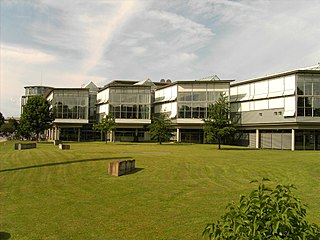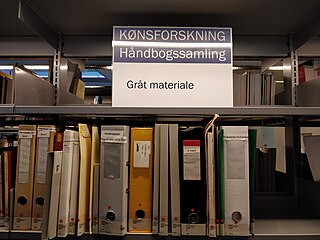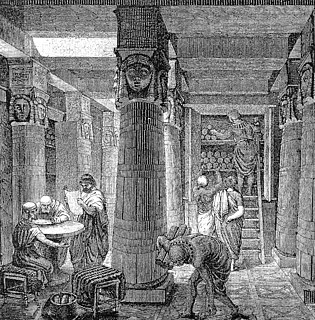Information science is an academic field which is primarily concerned with analysis, collection, classification, manipulation, storage, retrieval, movement, dissemination, and protection of information. Practitioners within and outside the field study the application and the usage of knowledge in organizations in addition to the interaction between people, organizations, and any existing information systems with the aim of creating, replacing, improving, or understanding information systems. Historically, information science is associated with computer science, data science, psychology, technology, library science, healthcare, and intelligence agencies. However, information science also incorporates aspects of diverse fields such as archival science, cognitive science, commerce, law, linguistics, museology, management, mathematics, philosophy, public policy, and social sciences.

A librarian is a person who works professionally in a library, providing access to information, and sometimes social or technical programming, or instruction on information literacy to users.

Academic publishing is the subfield of publishing which distributes academic research and scholarship. Most academic work is published in academic journal articles, books or theses. The part of academic written output that is not formally published but merely printed up or posted on the Internet is often called "grey literature". Most scientific and scholarly journals, and many academic and scholarly books, though not all, are based on some form of peer review or editorial refereeing to qualify texts for publication. Peer review quality and selectivity standards vary greatly from journal to journal, publisher to publisher, and field to field.
Michael Gorman is a British-born librarian, library scholar and editor/writer on library issues noted for his traditional views. During his tenure as president of the American Library Association (ALA), he was vocal in his opinions on a range of subjects, notably technology and education. He currently lives in the Chicago area with his wife, Anne Reuland, an academic administrator at Loyola University.

The Göttingen State and University Library is the library for Göttingen University as well as for the Göttingen Academy of Sciences and is the state library for the German State of Lower Saxony. One of the largest German academic libraries, it has numerous national as well as international projects in librarianship and in the provision of research infrastructure services. In the year 2002, the SUB Göttingen won the German Library of the Year award. Its current director is Wolfram Horstmann.
The following outline is provided as an overview of and topical guide to library science:

Grey literature is materials and research produced by organizations outside of the traditional commercial or academic publishing and distribution channels. Common grey literature publication types include reports, working papers, government documents, white papers and evaluations. Organizations that produce grey literature include government departments and agencies, civil society or non-governmental organizations, academic centres and departments, and private companies and consultants.
The term serials crisis has become a common shorthand to describe the chronic subscription cost increases of many serial publications such as scholarly journals. The prices of these institutional or library subscriptions have been rising much faster than the Consumer Price Index for several decades, while the funds available to the libraries have remained static or have declined in real terms. As a result, academic and research libraries have regularly canceled serial subscriptions to accommodate price increases of the remaining current subscriptions. Increased prices have also led to the increased popularity in shadow libraries.
Library and information science (LIS) is a branch of academic disciplines that deals generally with organization, access, collection, and protection/regulation of information, whether in physical or digital forms. By the late 1960s, mainly due to the meteoric rise of human computing power and the new academic disciplines formed therefrom, academic institutions began to add the term "information science" to their names. The first school to do this was at the University of Pittsburgh in 1964. More schools followed during the 1970s and 1980s, and by the 1990s almost all library schools in the USA had added information science to their names. Although there are exceptions, similar developments have taken place in other parts of the world. In Denmark, for example, the 'Royal School of Librarianship' changed its English name to The Royal School of Library and Information Science in 1997.

Frederick Gridley Kilgour was an American librarian and educator known as the founding director of OCLC, an international computer library network and database. He was its president and executive director from 1967 to 1980.

Project MUSE, a non-profit collaboration between libraries and publishers, is an online database of peer-reviewed academic journals and electronic books. Project MUSE contains digital humanities and social science content from over 250 university presses and scholarly societies around the world. It is an aggregator of digital versions of academic journals, all of which are free of digital rights management (DRM). It operates as a third-party acquisition service like EBSCO, JSTOR, OverDrive, and ProQuest.

A special library is a library that provides specialized information resources on a particular subject, serves a specialized and limited clientele, and delivers specialized services to that clientele. Special libraries include corporate libraries, government libraries, law libraries, medical libraries, museum libraries, news libraries. Special libraries also exist within academic institutions. These libraries are included as special libraries because they are often funded separately from the rest of the university and they serve a targeted group of users.
Music librarianship is the area of librarianship that pertains to music collections and their development, cataloging, preservation and maintenance, as well as reference issues connected with musical works and music literature. Music librarians usually have degrees in both music and librarianship. Music librarians deal with standard librarianship duties such as cataloging and reference, but the addition of music scores and recordings to collections complicates these tasks. Therefore, music librarians generally read music and have at least a basic understanding of both music theory and music history to aid in their duties.
Today in China, there are more than 8,000 academic journals, of which more than 4,600 can be considered scientific. About 1,400 cover health science.

Library science is an interdisciplinary or multidisciplinary field that applies the practices, perspectives, and tools of management, information technology, education, and other areas to libraries; the collection, organization, preservation, and dissemination of information resources; and the political economy of information. Martin Schrettinger, a Bavarian librarian, coined the discipline within his work (1808–1828) Versuch eines vollständigen Lehrbuchs der Bibliothek-Wissenschaft oder Anleitung zur vollkommenen Geschäftsführung eines Bibliothekars. Rather than classifying information based on nature-oriented elements, as was previously done in his Bavarian library, Schrettinger organized books in alphabetical order. The first American school for library science was founded by Melvil Dewey at Columbia University in 1887.
The Electronic Journal of Sociology was an online open access academic journal of sociology. It was established in 1994 by Michael Sosteric. Andreas Scheider was editor-in-chief until 2004, when Sosteric returned and Adam Rafalovich became co-editor-in-chief. The journal implemented a new approach in 2004 whereby it decided to publish three tiers of articles: fully reviewed original articles at tier 1, editorially-reviewed reviews and commentaries at tier 2, and editorially-reviewed other works, including original papers, at tier 3. Although the journal "achieved international recognition", as an electronic journal it faced barriers.

The National Library of Economics is the world's largest research infrastructure for economic literature, online as well as offline. The ZBW is a member of the Leibniz Association and has been a foundation under public law since 2007. Several times the ZBW received the international LIBER Award for its innovative work in librarianship. The ZBW allows for access of millions of documents and research on economics, partnering with over 40 research institutions to create a connective Open Access portal and social web of research. Through its EconStor and EconBiz, researchers and students have accessed millions of datasets and thousands of articles. The ZBW also edits two journals: Wirtschaftsdienst and Intereconomics.
International Consortium for the Advancement of Academic Publication (ICAAP) is non-profit publisher of academic journals, hosted at Athabasca University, Canada. It was founded as International Consortium for Alternative Academic Publication in 1998 by Mike Sosteric. It uses Open Journal Systems.
A library consortium is any cooperative association of libraries that coordinates resources and/or activities on behalf of its members, whether they are school, public, academic, special libraries and/or information centers. Consortia exist on a variety of levels, e.g., local, state, regional, national or international. Libraries commonly belong to multiple consortia. The goal of a library consortium is to amplify the capabilities and effectiveness of its member libraries through collective action, including, but not limited to, print or electronic resource sharing, reductions in costs through group purchases of resources, and professional development opportunities. The “bedrock principle upon which consortia operate is that libraries can accomplish more together than alone.”
The Zimbabwe Library Association (ZimLA) is an association that represents library, records, archives and information professionals in Zimbabwe. Membership for those who wish to join the association is voluntary.








